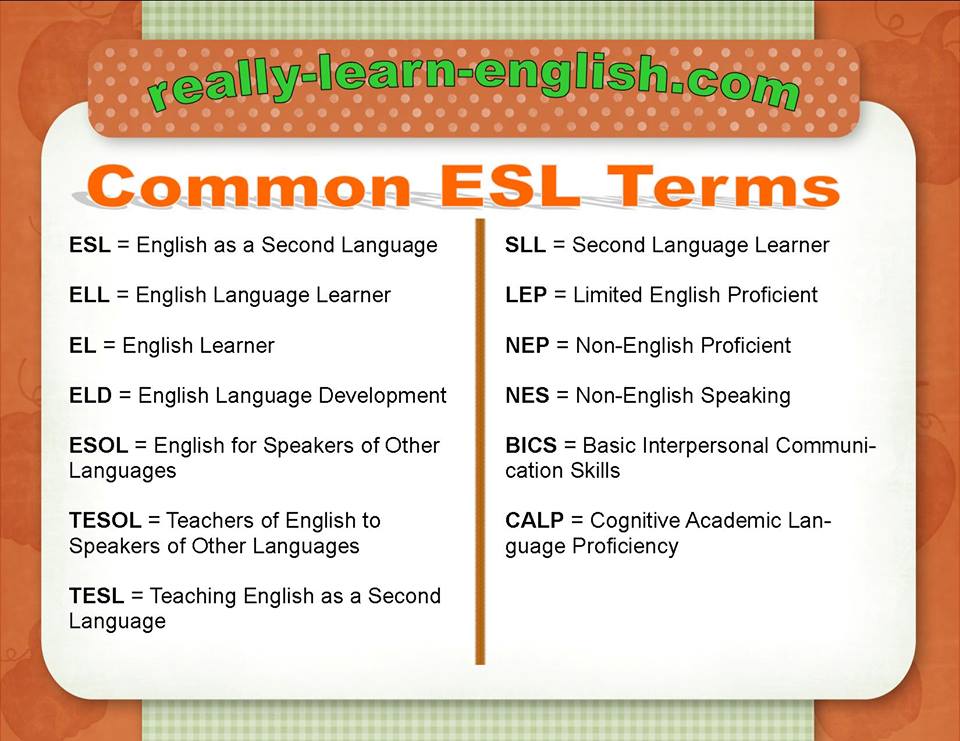ESL Terms
English teachers and learners can come across many different ESL terms, which are short and catchy, but sometimes misunderstood and confusing.
Click Here for Step-by-Step Rules, Stories and Exercises to Practice All English Tenses
This page will explain them so that you get a full understanding of what they really mean.

ESL Terms
| BEC | Business English Certificates Also known as Cambridge English: Business certificates. They are developed in accordance with the Common European Framework of Reference (CEFR). There are three certificates:
|
| BULATS | Business Language Testing Service A language assessment service by CambridgeESOL for the use of companies, organizations and students. The service provides:
|
| CambridgeESOL | University of Cambridge ESOL Examinations A non-profit assessment organization that provides examinations in English language ability for non-native speakers of English and English teaching qualifications. For more information, visit Cambridge English Exams |
| CEFR | Common European Framework of Reference An internationally recognized system for describing language ability. The levels are: A1, A2, B1, B2, C1, C3. A1 shows a basic knowledge in the language, and C2 is the proficiency level. For more information, visit What Are the CEFR Levels? |
| EAP | English
for
Academic Purposes A branch of ESP. Teaching English to people who are using English for study, but whose first language is not English. For example: Roberto arrives at Australia. He wants to attend the University of Sydney, but he's English is not good enough yet. He takes an EAP course to help him prepare for his English studies. |
| EFL | English
as a Foreign Language Teaching English to people for whom it is not the first language and who are not living in an English speaking country. For example: This time Roberto stays at Spain. He lives in a non English speaking country and has much fewer opportunities to be surrounded by English. He wants to improve his English skills so he takes a class that teaches English as a foreign language. You see, "foreign" means "of a country that is not your own," so English as a foreign language would mean that English is not the official language in that country (in our example – Spain). The class Roberto takes is composed of Spanish speaking students. They are EFL students, and the teacher is an EFL teacher. |
| EOP |
English
for Occupational Purposes A branch of ESP. Teaching English to people who are using English for work, but whose first language is not English. For example: Roberto lives in Spain and works as a lawyer. He has some knowledge of English, but he needs to improve it to do better on his job. So he takes a legal English course, where he learns exactly the things he needs to know for his professional needs. |
| ESL | English as a
Second Language Teaching English as a foreign language to people who are living in an English speaking country. (This term is typically used in the US and Canada.) For example: Roberto leaves Spain and arrives to the US to attend college. He lives in an English speaking country so he is surrounded by the English language. He wants to improve his English so he takes a class that teaches English as a second language. The class can have students from many different countries, who speak many different languages. They are ESL students, and the teacher is an ESL teacher. |
| ESOL |
English
for Speakers of Other Languages Teaching English as a foreign language to people who are living in an English speaking country. (This term is typically used in the UK and Ireland.) Basically, this term is the same as ESL, only that it is used in the UK and Ireland. |
| ESP | English
for Specific/Special Purposes Teaching English to people whose first language is not English for professional purposes. For example: Roberto lives in Spain and works in a high-tech company. He has some knowledge of English, but he needs to improve it to do better on his job. So he takes a business English course, where he learns exactly the things he needs to know to communicate in the English business world. This course is attended by many Spanish businessmen. They are ESP students, and the teacher is an ESP teacher. ESP concentrates more on language in context than on teaching grammar and language structures. Examples of ESP fields: Business English, Legal English, Medical English, Academic English, English for Travel, and so forth. For more information, visit Teaching English for Special Purposes |
| ICFE | International Certificate in Financial English Also known as Cambridge English: Financial. It is a high-level qualification in international accountancy and finance English. |
| ILEC | International Legal English Certificate Also known as Cambridge English: Legal. It is a qualification in international law English. |
| TEFL |
Teaching
English as a Foreign Language Teaching English to students whose first language is not English and who are not living in an English speaking country. For example: Kathleen wants to become an EFL teacher. Meaning, she wants to teach English as a foreign language. So she takes a TEFL course, where she learns how to teach English in foreign countries. When she completes her studies she teaches English as a foreign language in Japan to Japanese students. |
| TESL | Teaching
English as a Second Language Teaching English to students whose first language is not English and who are who are living in an English speaking country. For example: Kathleen wants to become an ESL teacher. Meaning, she wants to teach English as a second language. So she takes a TESL course, where she learns how to teach English to foreign students. When she completes her studies she teaches English as a second language in Los Angeles to immigrants from around the world. |

So these were the meanings of some of the major ESL terms in the subject of teaching/learning English.
We will be covering additional ESL terms in the future.
Get Updates, Special Offers, and English Resources
Download your FREE GIFT (the first two chapters of
English Short Stories Book and Workbook)
as soon as you join!

By submitting your email, you consent to receiving updates and newsletters from us and to the sharing of your personal data with third parties for the purposes of sending you communications. We will not spam you. You can unsubscribe at any time. For more information, please see our privacy policy.





